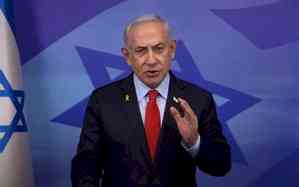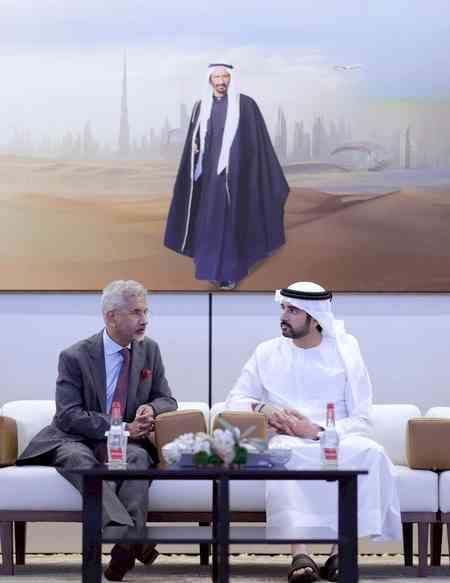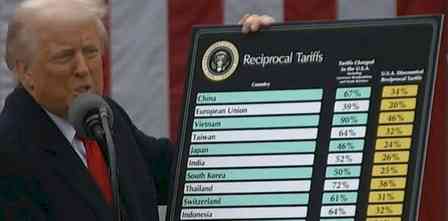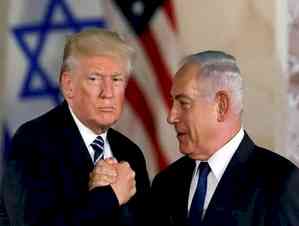Netanyahu says Israel reserves the right to return to war if Gaza ceasefire deal with Hamas falls apart
Israeli Prime Minister Benjamin Netanyahu has said that Israel reserves the right to resume fighting Hamas if its ceasefire-for-hostages deal with the militant group falls apart -- and that it would have US backing in doing so.

Tel Aviv, Jan 19 (IANS) Israeli Prime Minister Benjamin Netanyahu has said that Israel reserves the right to resume fighting Hamas if its ceasefire-for-hostages deal with the militant group falls apart -- and that it would have US backing in doing so.
In a televised address made hours before the ceasefire is set to begin Sunday morning, Netanyahu praised the deal, which he said was thanks in part to both the outgoing administration of US President Joe Biden and President-elect Donald Trump's incoming administration.
The Prime Minister, who faces a growing political firestorm surrounding the deal in Israel, vowed to "achieve all the goals of the war and bring everyone home".
"This agreement is, first and foremost, the result of the courage of our fighters in battle, and it is also the result of our steadfast stand on Israel's vital interests. A tough stand in the face of heavy pressures, both from within and abroad," Netanyahu said.
The Prime Minister cautioned Hamas to follow the rules of the deal.
Netanyahu said both Biden and Trump had agreed to support Israel's "right to return to fighting" if Hamas does not abide by the deal.
"I deeply appreciate that," he added.
"If we need to return to fighting, we will do so in new ways, and we will do it with great strength," Netanyahu said.
Netanyahu said that he stuck to three "fundamental principles" in the negotiations that led to the ceasefire-for-hostages deal agreed with Hamas.
First, he said in a televised address on Saturday, was Israel's right to return to war, with the backing of the US, if negotiations on the second phase of the deal break down.
Secondly, Netanyahu said he fought for a "significant increase" in the number of living hostages to be released in the first stage of the deal. He claimed to have "nearly doubled" that number since discussions in May, but did not specify.
Thirty-three hostages are expected to be released by Hamas in the first stage of the deal, but it remains unclear how many of them are living. Israel has typically included hostages who have died but whose remains have not been returned to Israel among its official hostage tally.
The third principle, according to Netanyahu, was that Israel would maintain full control over the Philadelphi Corridor -- the thin strip of land along the Gaza-Egypt border -- and the security buffer zone surrounding the entire Gaza Strip.
Israel's continued military presence in the Philadelphi Corridor was previously a sticking point in negotiations, but Netanyahu said Saturday that, "contrary to all the reports I hear from the outside," Israel was "not only not reducing the forces there -- we are even slightly increasing them".
Netanyahu added that the 42-day first phase, was a "temporary ceasefire".
"If we are forced to resume the war, we will do so with force," the Israeli PM said, adding that Israel had "changed the face of the Middle East" since the war began.
The pause in 15 months of war is a step toward ending the deadliest, most destructive fighting ever between Israel and the Hamas militant group — and comes more than a year after the only other ceasefire achieved.
The ceasefire between Hamas and Israel will go into effect Sunday at 8:30 am local time, mediator Qatar announced on Saturday.
Both sides have hinted that an exchange of hostages for prisoners will happen only after 4 p.m., as families of hostages held in Gaza braced for news of loved ones, Palestinians prepared to receive freed detainees and humanitarian groups rushed to set up a surge of aid.
Earlier, Netanyahu demanded that Hamas provide a list of names of hostages to be freed on Sunday before any prisoner swap takes place.
"We will be unable to move forward with the framework until we receive the list of the hostages who will be released, as was agreed," his office said.
His statement came almost three hours after Israel had expected to receive the names, which Hamas was to give to mediator Qatar. There was no immediate response from Hamas or Qatar.
--IANS
khz/


 IANS
IANS 








